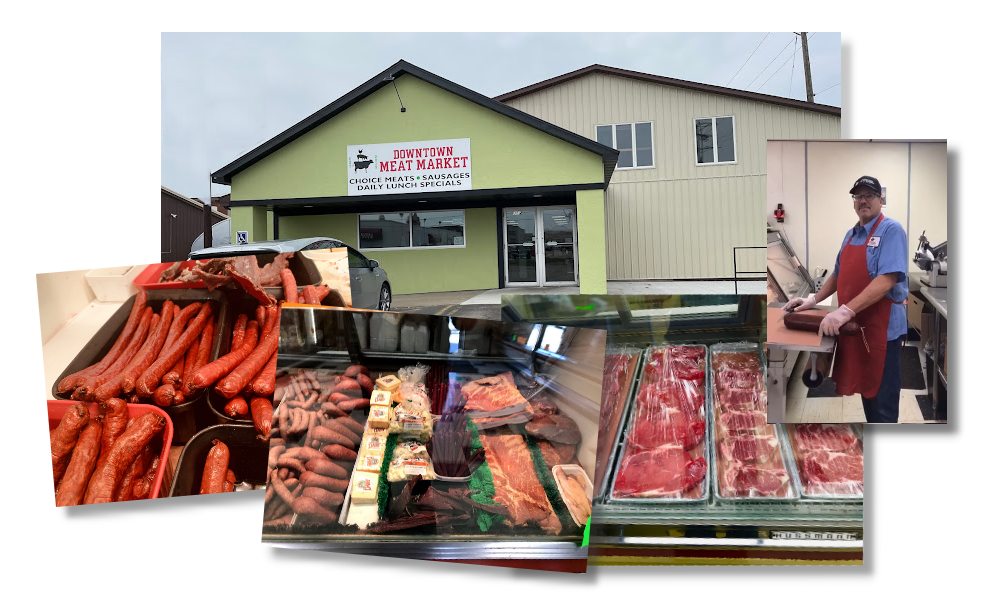Bagley Meat Market Edwardsville IL – Serving You with the Best Meats in Town
Why Choosing a Meat Market Over a Grocery Store Makes a Difference in Taste and Quality
The distinction in between purchasing meat from a specific market versus a supermarket typically depends on the nuanced layers of taste and quality. Meat markets commonly stress quality, sourcing their products from neighborhood ranches, which not only boosts taste but likewise promotes lasting techniques. In addition, the experience of experienced butchers can give invaluable understandings right into choosing the appropriate cuts for various cooking applications, ensuring an extra customized experience. The effects of these choices extend past simple flavor; they increase essential questions regarding the wider effect on customer habits and neighborhood economic situations. What else may be at risk?

Quality of Products
Focusing on quality is a substantial advantage of choosing a meat market over a grocery store. Meat markets commonly supply items that are sourced locally and refined with a concentrate on preserving optimal freshness. Unlike supermarkets, where meat may be kept for extensive durations, meat markets often obtain day-to-day deliveries, making certain that their supply is regularly renewed with premium cuts.
Additionally, meat markets typically have an extra reliable supply chain, reducing the moment from farm to table. This fast turnover not just enhances the flavor and appearance of the meat but also offers customers with guarantee relating to the top quality of the items they acquire. The competent butchers at meat markets can likewise offer important understandings into the freshness of their offerings, as they are thoroughly knowledgeable about their suppliers and the conditions under which the meat is dealt with.
On top of that, meat markets frequently prioritize whole cuts and specialty items that may not be readily available in supermarkets, enabling customers to discover a variety of alternatives that are fresher and much more savory. This commitment to quality inevitably contributes to a superior culinary experience, making meat markets an attractive choice for discerning consumers.
Sourcing and Sustainability
The commitment to quality at meat markets prolongs beyond freshness to incorporate sourcing and sustainability techniques. Unlike big supermarkets, which commonly depend on mass-produced products, meat markets prioritize local and ethical sourcing. This strategy not only sustains local farmers and breeders however also decreases the carbon footprint connected with moving meat over long ranges.

In addition, meat markets often offer a selection of cuts and specialty meats that show the periods and regional culinary traditions. This dedication to sustainability promotes a connection in between customers and their food resources, advertising transparency regarding the beginnings of the meat they buy. By choosing meat markets, customers can enjoy not only improved tastes however additionally the fulfillment of supporting sustainable and liable agricultural techniques.
Specialist Understanding and Suggestions
While purchasing at a meat market, customers gain from the professional understanding and personalized recommendations supplied by experienced butchers. These experts are commonly trained and possess substantial experience in the meat market, allowing them to offer understandings that go far beyond the fundamentals found in a supermarket. They can guide clients on picking the best cuts for specific recipes or occasions, guaranteeing optimum flavor and tenderness.

In addition, butchers usually make the effort to involve with customers, addressing questions and sharing ideas that are not easily available in a supermarket setting. This level of tailored solution promotes a much deeper link between customers and their food, inevitably elevating the overall culinary experience. By choosing a meat market, customers access to a riches of knowledge that can considerably affect their cooking and pleasure of meat.
Taste Accounts and Selection
When exploring the offerings at a meat market, clients are often rewarded with a diverse variety of taste profiles and cuts that are normally inaccessible in supermarkets. Unlike mass-produced meat items, which usually focus on uniformity, meat markets curate their selections based on top quality and regional uniqueness. This causes a selection of meats that mirror special preferences, appearances, and preparation approaches.

Seasonal and locally sourced alternatives even more improve the experience, as these products often possess exceptional freshness and taste. The educated butchers at meat markets can assist customers on the ideal cuts for specific recipes, making certain that each option get more aligns with desired flavor accounts and food preparation techniques. On the whole, the selection and quality found in meat markets not only raise the cooking experience however also motivate expedition and experimentation in home food preparation.
Sustaining Regional Economic Situations
Choosing a meat market not only enhances cooking experiences with diverse taste accounts but additionally plays a substantial role in supporting regional economic climates (bagley meat market edwardsville il). They are extra most likely to involve with organizations that source their products from regional ranches and manufacturers when consumers decide for meat markets over larger grocery store chains. This practice fosters a sustainable agricultural environment, encouraging farmers to keep standard methods that produce premium meats
Additionally, meat markets typically use neighborhood team, which contributes to task production and retention within the area. The economic impact expands beyond the immediate business; cash invested at local facilities often tends to flow within the area, benefiting various markets such as retail, marketing, and transport. This neighborhood financial investment helps enhance the general economic wellness of the location.
In addition, meat markets typically highlight transparency and ethical sourcing methods, which resonate with customers increasingly concerned regarding the origins of their food. By choosing to buy these facilities, consumers not just appreciate premium products yet likewise affirm their commitment to sustaining their neighborhood's economic climate. In significance, choosing a meat market is a deliberate option that nurtures both individual fulfillment and more comprehensive economic vitality.
Conclusion
Picking a meat market over a supermarket significantly influences preference and quality. Overall, the advantages of choosing a meat market expand beyond specific preferences, affecting more comprehensive ecological and financial variables while boosting the art of cooking.
Unlike grocery stores, where meat might be saved for prolonged durations, meat markets usually receive everyday shipments, ensuring that their stock is continually replenished with high-quality cuts.
The knowledgeable butchers at meat markets can likewise offer useful insights into the quality of their offerings, as they are thoroughly acquainted with their vendors and the conditions under which the meat is handled.
Additionally, meat markets commonly provide a range of cuts and specialty meats that reflect the periods and neighborhood cooking customs. By picking a meat market, consumers get access to a wealth of expertise that can dramatically affect their food preparation and pleasure of meat.
Unlike mass-produced meat items, which commonly focus on harmony, meat markets curate their selections based index on top quality and local specificity.